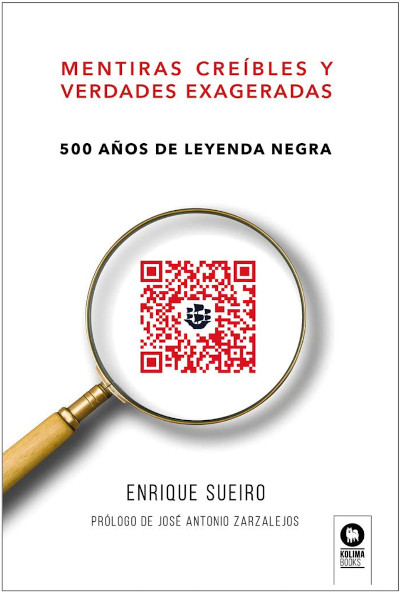In the picture
Cover of the book by Enrique Sueiro 'Mentiras creíbles y verdades exageradas. 500 años de Leyenda Negra' (Madrid: Kolima, 2022), 364 p.
In the context of recent books that vindicate the good name of Spain in its historical presence in Spanish America -certainly admitting abuses, but firmly combating the Black Legend- this contribution by Enrique Sueiro is interesting for the argumentative detail it presents. He unveils "the lie of the exaggerated truth", analyzing the denunciations of Fray Bartolomé de las Casas, which provided the initial ammunition for the negative narrative about the Spanish Empire, and combats "the lie of the omitted truth", comparing Spain's colonizing work with that of other powers, whose negative aspects, of greater caliber in many respects, are often overlooked.
Dedicated professionally to management communication and reputation, Sueiro gives the book a certain air of reputational guide , with conclusions at the end of each chapter in the form of points that can serve to guide the leadership of companies and other organizations. Logically, however, this book can also be read as a narrative about the story that took shape in the 16th century and what it really should have been based on the true facts.
If we take into account the recent literature related to this subject, Sueiro's contributions include the detailed analysis of what Bishop De las Casas wrote, in which the Dominican's exaggeration and lack of historical rigor are clear, although he may be admittedly well-intentioned in his warnings to the Crown; and the profusion of data about what others did: how the Spanish Inquisition was more benevolent than similar institutions in England or Germany, for example, or how other colonizing processes promoted a systematic indigenous extermination that did not occur in Spanish America.
The Black Legend is essentially a reputational phenomenon -the hoax that others spread against Spain and the absence of a Spanish strategy to deal with it-, that is why Sueiro's approach makes special sense. The Legend -not the name, since the designation of Black Legend began to be applied at the beginning of the 20th century- originated in Italy in the 16th century. The Italian ruling classes, who saw themselves as heirs to a superior culture and disdained the Spaniards, who controlled part of their territory, promoted a negative story about Spain and the work that gave it the greatest glory: the conquest of America. The campaign caught on immediately in the Netherlands, also under Spanish rule, and then spread to other countries, such as France and England. It can be seen as a reaction of envy from the rising powers, who did not admit that a country they considered culturally inferior had been capable of such an admirable achievement in their eyes. From then on, the ball has not stopped rolling. "The Spanish Black Legend is not the first 'fake news' or disinformation in history, but it is perhaps one of the largest in dimension and multi-secular impact," says the author.
The book also includes a chapter dedicated to the personality of Philip II and his confrontation with Antonio Perez, another Spaniard who provided ammunition against his country: after occupying the position of right hand of the king and then being arrested, he fled to France and England to propagate among his courts advertising negative about Spain. A final chapter reviews the fallacies surrounding the episode of the Invincible Armada, an adjective the author prefers not to use because it was the result of English propaganda.
The work is easy to read and its apologetic tone reinforces the clarity of the exposition, although the desire to combat unjust accusations makes it somewhat taxing in some aspects. He himself acknowledges, in the acknowledgment pages, having faced the difficulty of finding the right tone for the text: the doubt as to whether to accentuate or moderate certain considerations in "such delicate" matters.

